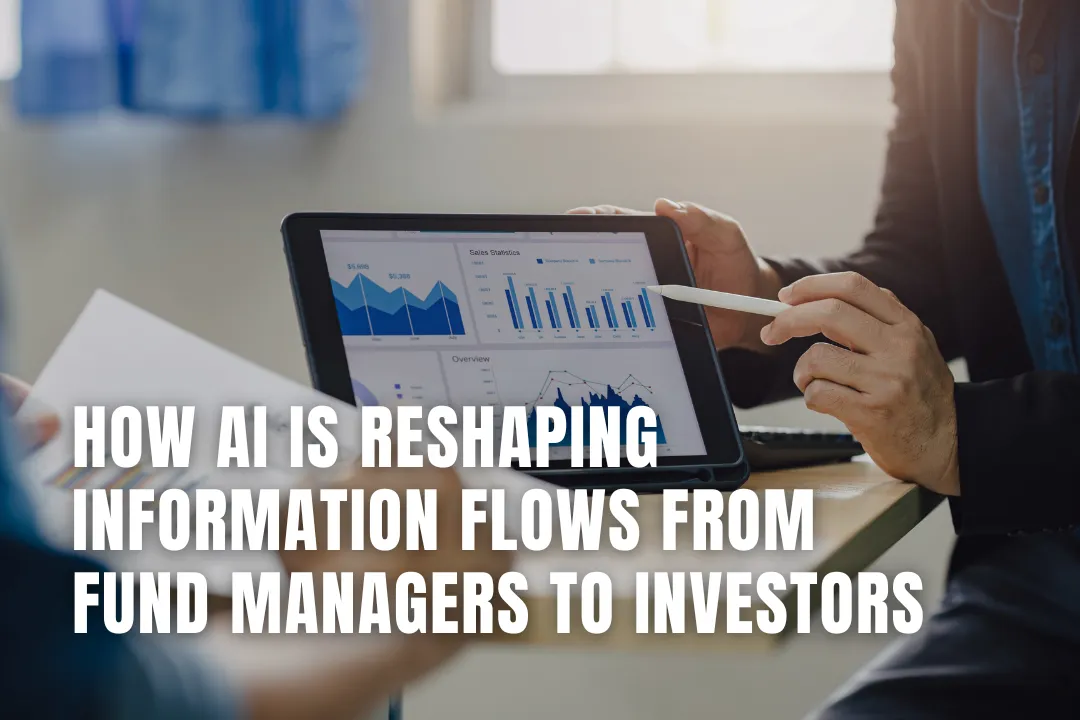How AI Is Reshaping Information Flows From Fund Managers To Investors
July 14, 2025

The relationship between fund managers and investors depends heavily on accurate, timely, and relevant information. Traditionally, this flow has relied on quarterly reports, analyst calls, and dense performance summaries. However, artificial intelligence is now transforming how this communication occurs. AI technologies are being integrated into the daily workflows of asset managers to ensure investors receive clearer insights with greater efficiency.
Key Takeaways On How AI Is Reshaping Information Flows
- AI-Powered Data Analysis: AI algorithms can analyze vast datasets to identify trends and patterns, providing fund managers with deeper insights into market dynamics and investment opportunities.
- Enhanced Communication Strategies: AI facilitates personalized and timely communication between fund managers and investors, improving transparency and trust.
- AI-Driven Automation: AI automates routine tasks, freeing up fund managers to focus on strategic decision-making and client relationship management.
- Improved Risk Management: AI enhances risk management by identifying potential risks and vulnerabilities in investment portfolios, enabling fund managers to make informed decisions.
- AI in Regulatory Compliance: AI assists fund managers in navigating complex regulatory landscapes by automating compliance processes and ensuring adherence to industry standards.
Register Your LLC
Company Registration
START NOW
Automating Data Aggregation and Reporting
One of AI’s primary benefits in asset management is the automation of data collection. Fund managers handle large volumes of structured and unstructured data from multiple sources. AI systems can extract and consolidate this data in real time. This streamlined process allows managers to generate reports that reflect current positions and market exposure with much shorter lead times than traditional methods.
Natural language processing (NLP) is also improving how reports are written. AI tools can draft summaries of fund performance and market commentary by analyzing relevant data sets, which helps standardize language while ensuring accuracy. These reports are then reviewed by analysts before distribution, allowing teams to focus more on strategy than formatting and data checks.
Enhancing Customization of Investor Communications
Artificial Intelligence enables more personalized reporting based on investor profiles. For example, institutional investors may receive highly detailed analytics, while individual investors might be provided with simplified summaries focusing on key performance indicators. Machine learning algorithms can assess investor preferences and automatically adjust the depth and structure of the information provided. This flexibility helps fund managers maintain engagement and transparency with diverse audiences.
Some platforms now offer interactive dashboards powered by AI, where investors can filter data by timeframe, asset class, or risk category. These tools not only provide a clearer picture of fund performance but also allow investors to identify patterns or anomalies that might affect decision-making.
Real-Time Risk Monitoring and Alerts
Fund managers use AI models to track risk exposure across portfolios, which in turn benefits investor communications. When asset allocations deviate from defined risk thresholds or when market volatility affects performance, AI systems can trigger alerts or flag concerns in internal dashboards. This proactive approach improves responsiveness and supports better-informed investor updates.
Integrating private debt software into AI-driven systems has also improved data visibility in less liquid markets. Managers of private credit funds can now provide more frequent and accurate updates to investors, despite the traditionally slower reporting cycles associated with private debt instruments.
Improving Transparency and Investor Confidence
Frequent and transparent communication fosters trust between fund managers and investors. AI is playing a central role in facilitating this trust by providing accurate data more quickly and reducing the lag between events and updates. While final decisions and interpretations still depend on human oversight, AI helps eliminate bottlenecks that have historically slowed communication.
As AI tools continue to evolve, the way fund managers share information will likely become even more responsive and adaptive. Investors benefit through improved clarity, and fund managers gain more time to focus on core investment decisions rather than administrative reporting tasks. To learn more, check out the infographic below.
.webp)

